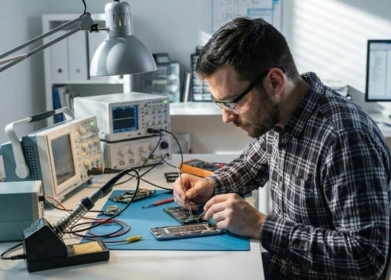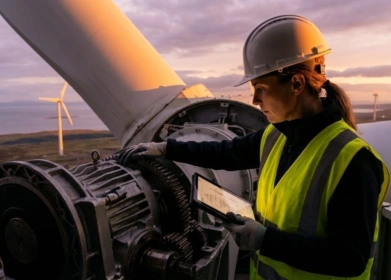What Degree Do You Need To Be an Aerospace Engineer?
Discover the educational paths to becoming an aerospace engineer. Explore the degrees, certifications, and skills needed for a successful career in aerospace engineering.
Jennifer Sheriff

Aerospace engineering is a field that captivates those with a passion for flight, space exploration, and advanced technology. As you contemplate a career in aerospace engineering, you may be wondering what the requirements are. What degree do you need to become an aerospace engineer? This article will guide you through the educational pathways and qualifications necessary to enter this dynamic field.
Understanding Aerospace Engineering
Before diving into the educational requirements, it’s essential to grasp what aerospace engineering entails. Aerospace engineers design, develop, and test aircraft, spacecraft, satellites, and missiles. They work on various aspects of aerospace systems, including aerodynamics, propulsion, structural design, and avionics.
Educational Requirements
Bachelor’s Degree in Aerospace Engineering
The most direct route to becoming an aerospace engineer is to earn a Bachelor’s degree in Aerospace Engineering. This degree provides a comprehensive foundation in the principles and practices of aerospace engineering. Here’s what you can expect:
Core Curriculum: The coursework typically includes subjects such as fluid dynamics, propulsion systems, aerodynamics, control systems, and structural analysis. Students also take mathematics and physics courses, which are fundamental to understanding engineering concepts. Aerospace engineering programs typically have a high level of academic rigor, and students should be prepared for this.
Laboratory and Design Work: Hands-on experience is a critical component of aerospace engineering education. Students engage in laboratory work, design projects, and simulations to apply theoretical knowledge to practical problems.
Accreditation: It’s important to choose a program accredited by the Accreditation Board for Engineering and Technology (ABET). ABET accreditation ensures that the program meets high educational standards and adequately prepares students for professional practice.
A Bachelor’s degree in Aerospace Engineering typically takes four years to complete. Graduates are prepared for entry-level positions in the aerospace industry, including roles in aircraft design, propulsion systems, and avionics.
Master’s Degree in Aerospace Engineering
While a Bachelor’s degree is sufficient for many entry-level positions, pursuing a Master’s degree in Aerospace Engineering can open doors to advanced roles and specialization. Here’s what to consider:
Specialization: A Master’s degree allows students to focus on specific areas within aerospace engineering, such as spacecraft design, UAVs (unmanned aerial vehicles), or advanced propulsion systems. Specialization can enhance expertise and career prospects.
Research Opportunities: Many Master’s programs include research components, where students work on cutting-edge projects and contribute to advancements in aerospace technology. This experience can be valuable for those interested in research or academic careers.
Time Commitment: A Master’s degree typically takes two years to complete if pursued full-time. Some programs offer part-time options for working professionals.
A Master’s degree can lead to positions in research and development, project management, and advanced engineering roles. It also prepares graduates for doctoral studies if they wish to pursue a Ph.D. in aerospace engineering.
Ph.D. in Aerospace Engineering
For those interested in pursuing careers in academia, research, or high-level technical roles, a Ph.D. in Aerospace Engineering is the highest level of education. Here’s what to know:
Research Focus: Ph.D. programs emphasize original research, allowing students to contribute new knowledge to the field. Doctoral candidates work closely with faculty advisors on research projects and publish their findings in academic journals.
Teaching and Academia: A Ph.D. is often required for academic positions at universities. It also prepares individuals for roles in research institutions or high-level research and development positions in industry.
Time Commitment: Earning a Ph.D. typically takes four to six years beyond the Master’s degree. This includes coursework, comprehensive exams, and dissertation research.
A Ph.D. in Aerospace Engineering can lead to careers in academic research, high-level consulting, and leadership roles in industry and government.
Additional Qualifications and Skills
In addition to formal degrees, aerospace engineers benefit from additional qualifications and skills:
Professional Licensure
Professional Engineer (PE) License: While not always required, obtaining a PE license can enhance career prospects, particularly for those in engineering design and consulting. The PE license demonstrates professional competency and adherence to ethical standards.
Requirements: To obtain a PE license, candidates must pass the Fundamentals of Engineering (FE) exam, gain relevant work experience, and pass the Principles and Practice of Engineering (PE) exam.
Certifications
Specialized Certifications: Depending on the area of focus, aerospace engineers may pursue certifications related to specific technologies or methodologies. Examples include certifications in avionics, propulsion systems, or software development.
Project Management Certification: For those interested in project management roles, certifications such as Project Management Professional (PMP) can be beneficial.
Soft Skills
Problem-Solving: Aerospace engineers must be adept at identifying and solving complex engineering problems. Strong analytical skills are essential for developing innovative solutions.
Teamwork and Communication: Many aerospace projects involve interdisciplinary teams. Effective communication and collaboration skills are crucial for working with engineers, scientists, and other stakeholders.
Creativity and Innovation: Designing advanced aerospace systems requires creativity and the ability to think outside the box. Aerospace engineers must be innovative in developing new technologies and solutions.
Career Pathways
With the appropriate degrees and qualifications, aerospace engineers can pursue various career pathways:
Design and Development: Engineers in this area focus on creating and improving aircraft, spacecraft, and related systems. They work on everything from conceptual design to testing and production.
Research and Development: R&D roles involve exploring new technologies and pushing the boundaries of aerospace engineering. This includes developing new propulsion systems, advanced materials, and innovative spacecraft designs.
Defense and Military Applications: Aerospace engineers working in defense focus on designing military aircraft, missile systems, and other technologies related to national security.
Space Exploration: Engineers in space exploration work with organizations like NASA or SpaceX to develop spacecraft and systems for space missions, satellite deployment, and space research.
Consulting and Entrepreneurship: Aerospace engineers may also pursue careers in consulting or start their own businesses, providing expertise and solutions to aerospace challenges.
Level Up with an Aerospace Engineering Degree
Becoming an aerospace engineer requires a solid educational foundation, starting with a Bachelor’s degree in Aerospace Engineering. For those seeking advanced roles or specialized expertise, pursuing a Master’s or Ph.D. can provide additional opportunities. Complementing formal education with professional licensure, certifications, and soft skills further enhances career prospects.
The field of aerospace engineering offers diverse and exciting career opportunities, from designing cutting-edge aircraft to exploring the depths of space. If you’re passionate about aerospace technology and committed to advancing your knowledge, a career in aerospace engineering can be both fulfilling and impactful. With the right degree and qualifications, you’ll be well-prepared to embark on a successful career in this dynamic and evolving field.
Related Articles

Unlocking Your Future: The Tangible Benefits of an Electrical Engineering Degree
From the smartphone in your pocket to the power grid that lights your home, electrical engineering is the invisible force shaping the modern world. It’s a discipline that translates the abstract principles of physics into the tangible technologies we rely on every day.For those considering this dynamic field, the benefits extend far beyond a challenging curriculum; a degree in Electrical Engineering (EE) is a key that unlocks a future of innovation, impact, and unparalleled opportunity.
Read More
How to Pivot Your Career: The Masters in Mechanical Engineering Roadmap
The core principles of mechanical engineering are timeless, yet their applications are constantly expanding. The rise of automation, the urgency of climate change, and the explosion of data have created new frontiers where mechanical engineers are uniquely positioned to make a significant impact. Staying relevant and seizing these opportunities often requires a deeper, more specialized skill set than what an undergraduate degree can provide.
Read More
The Best Online Engineering Degrees for Explosive Career Growth & High ROI
The rise of accredited, rigorous online engineering degrees has created an unprecedented opportunity to gain elite skills, accelerate career growth, and achieve a remarkable return on investment—all on your own terms. This article is designed to cut through the noise. We will explore the specific online engineering disciplines that offer explosive career growth, delve into what a high ROI truly means in this field, and provide a clear roadmap for selecting and financing a program that aligns perfectly with your ambitions.
Read More